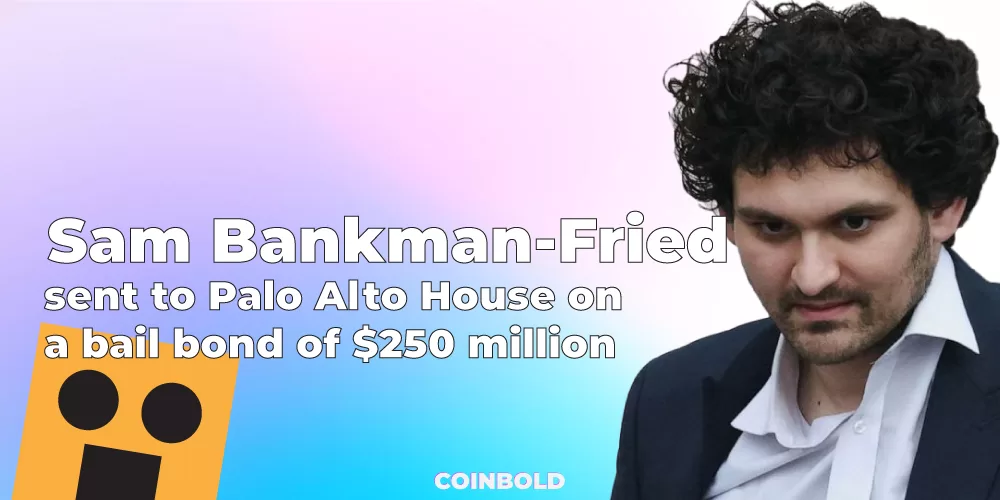The creator of the defunct cryptocurrency exchange FTX, Sam Bankman-Fried, also known as SBF, was released on bail in the amount of $250 million and transferred to the home of his parents in Palo Alto, California (SDNY).
Wednesday was the day that SBF signed his extradition papers in the Bahamas so that he could be brought to the United States to face fraud charges. The FBI was the organization responsible for transporting SBF.
According to the court reporter Matthew Russell Lee of Inner City Press, who was live tweeting the hearing, Magistrate Judge Gabriel W. Gorenstein started reading the two counts of wire fraud and six counts of conspiracy against SBF related to securities and commodities fraud, money laundering, and violating the campaign finance laws.
According to Assistant US Attorney Nick Roos, the court is required to take into consideration the weight of the evidence when determining whether or not to grant bail. “This was a scam of really monumental dimensions. Detention would most certainly be warranted if it was the sole test that was administered. On the other hand, he freely agreed to his extradition. That need to be taken into consideration,” Roos pointed out.
Roos stated, “Had he continued to resist, we would have taken a position against his release.” However, his assets are now worth less. Because of this illegal activity in the financial sector, he is no longer employed by either FTX or Alameda. Therefore, the potential danger to the neighborhood is not a primary concern. We recommend a bail package that is rather stringent.”
Among the strict bail terms he recommended was a $250 million bond, which Roos said is thought to be the biggest federal pretrial ever, and house detention at his parents’ home in Palo Alto. Roos also suggested that he be detained at his parents’ home during his house detention.
The house arrest order and the bail were both given the go light by Magistrate Judge Gabriel W. Gorenstein, who also permitted home detention with local surveillance.
According to Roos, the bond was going to be guaranteed by the equity in his parents’ home, as well as their signatures and the signatures of two additional financially responsible people who had significant assets.
Because the bail was designated as a “personal recognizance bond,” the value of the collateral was not required to be equivalent to the whole amount of the bail. An additional component of a recognizance bond is a written promise from the defendant that they will appear in court when required.
The court has mandated that in addition to Bankman-Fried and his parents, the bond must include signatures from two more parties by January 5; however, none of those parties may be related to Bankman-Fried in any way.
If SBF is unable to submit the signatures by the deadline, Gorenstein has the authority to alter the order to waive the need for the additional signatories by waiving the need for them.
Bankman-Fried is going to have to give up his passport, and he won’t be able to create any new enterprises or spend more than $1,000 on anything that isn’t related to his legal fees.
In addition to that, SBF will get therapy for their mental health and treatment for their drug misuse. Bankman-Fried is required to restrict the amount of time he spends traveling to and from the Northern District of California, the Southern and Eastern Districts of New York, and the Southern District of New York.
Sam Bankman-Fried, according to Judge Gorenstein, does not have any past criminal history at any time and has significant links to the United States. According to Gorenstein, there is no evidence of SBF members engaging in violent behavior, and this is the organization’s first arrest.
Judge Gorenstein made the following observation: “The defendant has obtained such celebrity that it would be hard for him to continue financial transactions; this notoriety also goes to the possibility of flight.” He wouldn’t go unnoticed at all. Therefore, I am going to provide permission to disclose…
Mark Cohen, the high-profile defense attorney for SBF, asked Judge Gorenstein if SBF can attend the next conference virtually before District Judge Abrams on January 3. In response, Judge Gorenstein told Cohen that he should ask Judge Abrams, who agreed to an exclusion of Speedy Trial Act time until January 3 and told Gorenstein that they should ask Judge Abrams. Abrams agreed to the exclusion of Speedy Trial Act time.
At the conclusion of the hearing, Judge Gorenstein questioned SBF by saying, “Mr. Bankman-Fried, if you breach the terms, a warrant will be issued for your arrest.” Do you understand?” “Yes I do,” was the response that was given by Bankman-Fried.
The cryptocurrency community is understandably outraged by the decision to let SBF continue living in his parents’ home with very little restrictions, all the while the people that he defrauded continue to be without any hope. Crypto Twitter is asking him where he acquired the money for the bail since SBF had previously stated that he only had $100,000 in his bank account at the time of the incident.
Compiled by Coinbold

